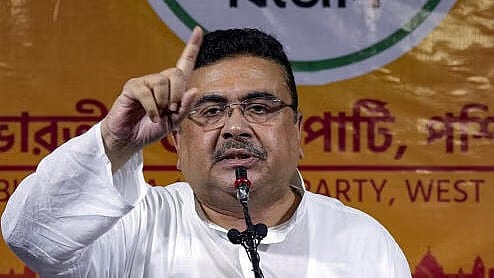
Suvendu Adhikari.
Credit: PTI File Photo
West Bengal Legislative Assembly Leader of the Opposition Suvendu Adhikari lost the plot on March 11, thundering that the Bharatiya Janata Party (BJP) would ‘physically throw Muslim MLAs out of the Assembly’ after the party formed a government in the state. Why, shouldn’t this classify as hate speech?
On March 13, Suman Roychaudhuri, a West Bengal Pradesh Congress Committee member, filed a first-information report, claiming that the statement would create unrest, and foment communal tension.
Be that as it may, something extraordinary elicited this outburst from Adhikari, though he has form when it comes to making inflammatory and divisive statements. We shall return to this.
Let’s note that the day before Adhikari’s over-the-top statement, Tapasi Mandal, the BJP MLA from Haldia, in Purba Medinipur district, switched over to the Trinamool Congress (TMC). Mandal was known as one of Adhikari’s close aides in what is his home turf. Mandal’s defection is hardly the first to thin the BJP’s ranks in the Assembly. Of the 77 MLAs elected on a BJP ticket in 2021, 12 have defected to the TMC.
If this is one cause of Adhikari’s frustration, the results of the 2024 Lok Sabha elections must be another. The BJP won 12 seats with a vote share of 38.73%, down six seats and almost 2% of the vote as compared to the 2019 elections. In the 2021 Assembly elections, the BJP had won 38.15% of the votes.
Adhikari joined the BJP after quitting the TMC in December 2020. The 2019 elections, the BJP’s most successful foray, was fought under the leadership of Dilip Ghosh and the 2021 Assembly elections under state party president and Balurghat MP Sukanta Majumdar. These results set a high bar for 2024.
Adhikari was given a starring role in running the 2024 general election campaign, even though Majumdar was the party chief. A robust showing would have cemented his position in the BJP, but a distinctly subpar performance meant that Adhikari could not strengthen his grip on the party organisation.
It is arguable that a change of guard in the state — due since Majumdar now holds the position of a Union minister of state and should be removed from his party post under the BJP’s ‘one man, one post’ rule — could have bolstered Adhikari’s position if the right man was appointed. But the fact that the BJP central leadership has chosen to keep Majumdar in place for almost a year seems to signal that it does not want the consolidation of power in any one person. This is presumably galling for Adhikari.
Adhikari has responded with communal vituperation earlier in adverse situations. In the wake of the BJP’s poor showing in the 2024 elections, he rubbished his party’s ‘sab ka saath, sab ka vikas’ slogan, proposing that his party should say, ‘jo hamare saath, hum unke saath (we are with those who are with us)’. He had also said the party did not need a minority morcha.
The BJP is yet to take any disciplinary action against Adhikari. In fact in the run-up to the 2021 elections, he had harped on the fact that Hindus constitute 70% of West Bengal’s electorate, which was with his new party. There are also other instances of Adhikari indulging in divisive rhetoric.
Adhikari’s resort to inflammatory and divisive speeches, when viewed in a long-term perspective, has two objectives. First, and more obviously, it is an attempt to polarise the West Bengal electorate and convert the ‘majority community’ into an impregnable vote-bank. Second, the objective is to continually bolster Adhikari’s position in a faction-ridden party, where one of the most important axes of division is between old-timers and defectors. Though Adhikari has been in the BJP for over four years and has carved out a niche for himself, questions about the role of defectors have not gone away.
With Assembly elections scheduled for just over a year later, the TMC looks to be on a far firmer footing than the BJP in what will likely be a bipolar contest. As long as Adhikari and his ilk continue to bank on communal polarisation, so successful in the Hindi heartland, they are unlikely to break fresh ground in West Bengal.
West Bengal’s social and political realities cannot be jammed into the Procrustean bed of heartland dynamics.
(Suhit K Sen is author of ‘The Paradox of Populism: The Indira Gandhi Years, 1966-1977’.)
Disclaimer: The views expressed above are the author's own. They do not necessarily reflect the views of DH.